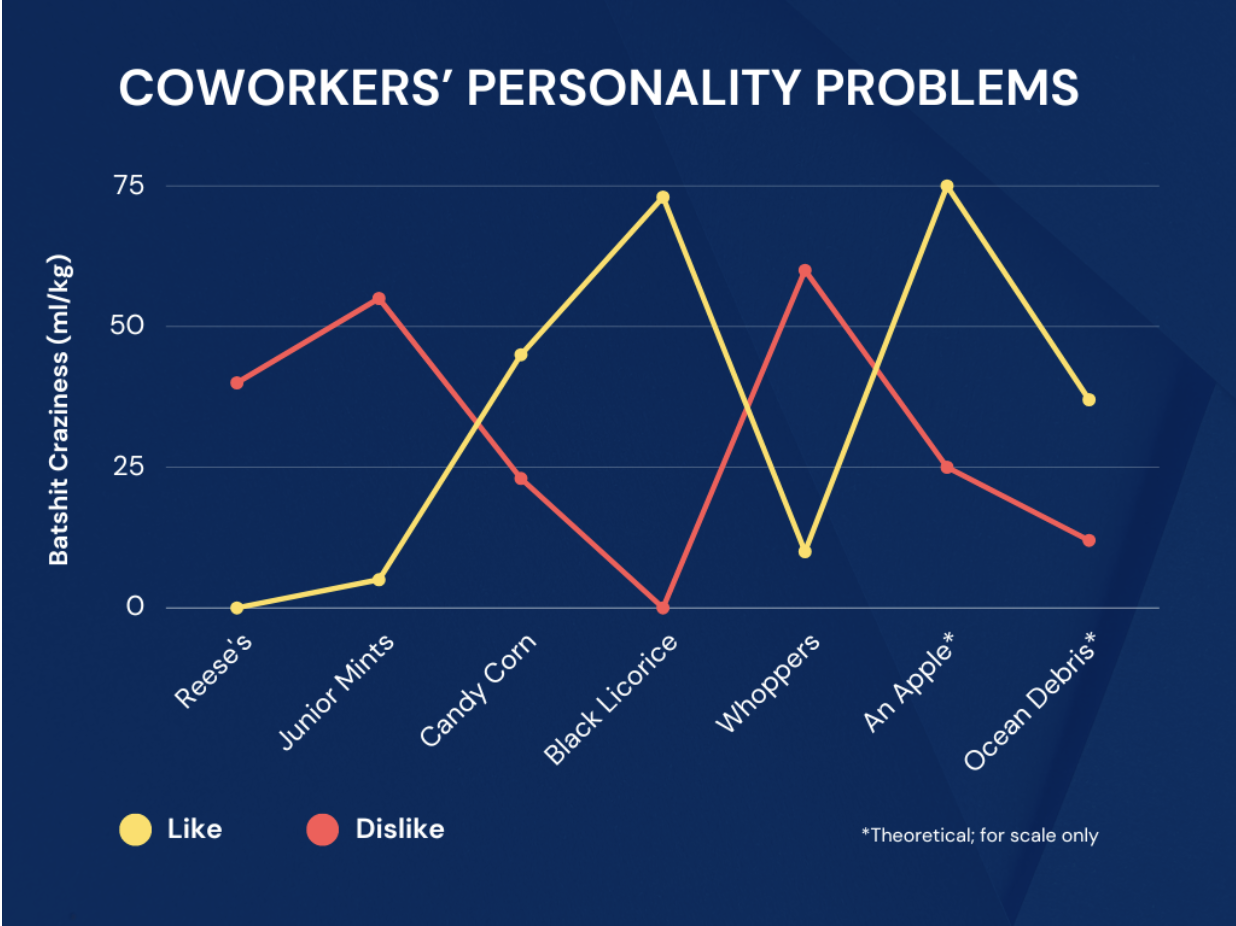Journal of Applied Psychology, Oct. 2023
Uncovering Personality Defects Through a Sham Survey of Coworkers’ Halloween Candy Preferences
Abstract
Background
In 2013, Meynard and Strüble hypothesized that most personality disorders are best revealed not by the Mclean Screening Instrument (MSI), the 4th edition Personality Diagnostic Questionnaire (PDQ4), or other gold-standard assessments. They argued instead that self-reported candy preferences give clinicians the clearest picture of who is a dangerous lunatic and who is not.
In the present study, the authors tested that hypothesis by administering a sham survey over several days to adult professionals in the authors’ own place of work. As the predictor variable, we entered participants’ like or dislike of various Halloween candies. As the test variables, we entered participants’ mental habits, personality defects, and grip on reality or complete lack thereof, among other variables.
Methods
Study participants were recruited in two stages in September 2023 over a company-wide communication platform (Figure 1). In stage one, participants were asked to choose their least favorite Halloween candy; in stage two, their favorite. Participants were told only that their opinions of various Halloween candies would appear in the next issue of the company E-newsletter.
Figure 1. Recruitment of Study Participants with Sham Survey
28 subjects were recruited during stage one and 26 during stage two. Their responses and associated clinical signals, in total, reveal high levels of batshit craziness within the company (Figure 2).
Results
Dislikes
Five subjects chose Tootsie Rolls as their least favorite candy, a sign of severe psychic disturbance; these subjects are behind the conspiracy theory that birds aren’t real.
Three subjects chose Jolly Ranchers; the authors estimate that these subjects run errands with an exotic pet perched on their shoulder.
Three subjects chose Junior Mints as their least favorite candy, which is obviously deranged. We recommend these subjects be put in one of those Hannibal Lecter masks with the bars over the mouth.
Two subjects chose Big Hunks, forgetting all about the nougat in the center that redeems the rest of the bar; these subjects clap when the plane lands.
Four subjects chose candy corn as their least favorite, leaving the authors no choice but to declare them a roving gang of insurance fraudsters.
Seven subjects called Whoppers their least favorite candy; the authors are flabbergasted by this choice. Let the record reflect the gasting of the authors’ flabbers by these sick, sick people.
Five subjects disliked Almond Joy the most, indicating an inability to experience joy from almonds or other sources.
Nine subjects chose black licorice; these subjects are sane but they do the th sound when they pronounce Barcelona, and it’s like ugh, come on.
Figure 2. Personality Problems of Study Participants as a Ratio of Volume to Weight.
Likes
12 subjects expressed a preference for Reese’s Peanut Butter Cups, indicating they become too invested in Love Is Blind sometimes but otherwise behave normally.
Nine subjects chose Snickers as their favorite candy; we estimate these subjects talk to themselves >1 hour/day in a singsong voice.
Seven subjects chose KitKat bars, indicating that they practice taxidermy late at night in a wedding dress.
A single subject liked Skittles the most; this subject flies into a towering rage when their Uber passenger rating drops below five stars.
A single subject chose candy corn as their favorite. This subject is a pathological hipster and likely boasts an impressive mustache and vinyl collection.
With a straight face, one subject chose Smarties as their favorite candy; this subject makes frequent trips to countries with no U.S. extradition, if you catch our drift.
Three subjects chose Butterfingers, indicating that they once threw a cat headfirst into a snowbank.
Conclusions
From these results, the authors conclude that candy preferences constitute a high-reliability test (⍶ > 0.92) for personality defects. Further, the authors conclude they are in danger every time they go to the office. More study is needed to determine prognoses and treatment options.
Acknowledgments
The authors acknowledge a debt to Gustoffsen et al. for their foundational research linking Milky Way preference to bad credit.
The authors acknowledge the th sound in Barcelona is OK if you need to seem smart on a date.

